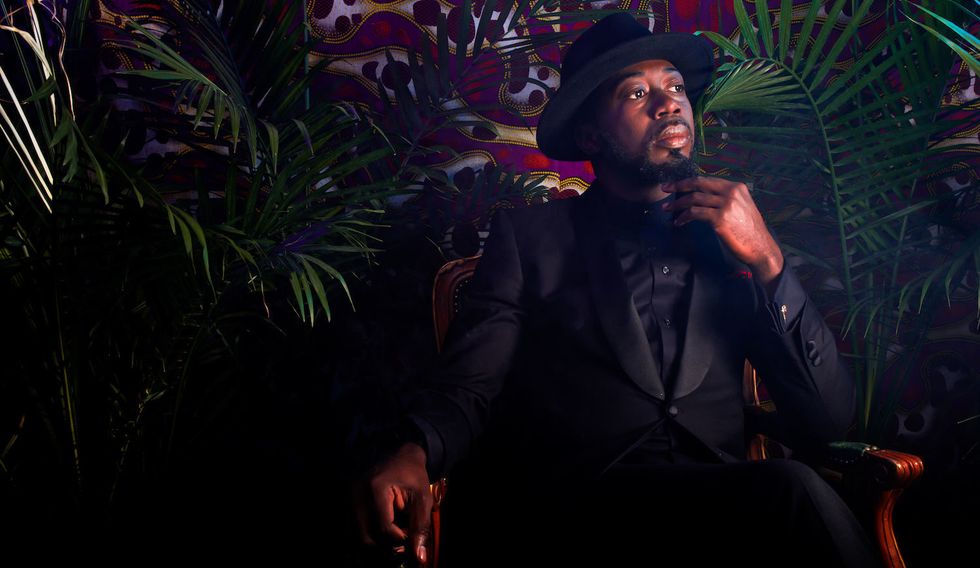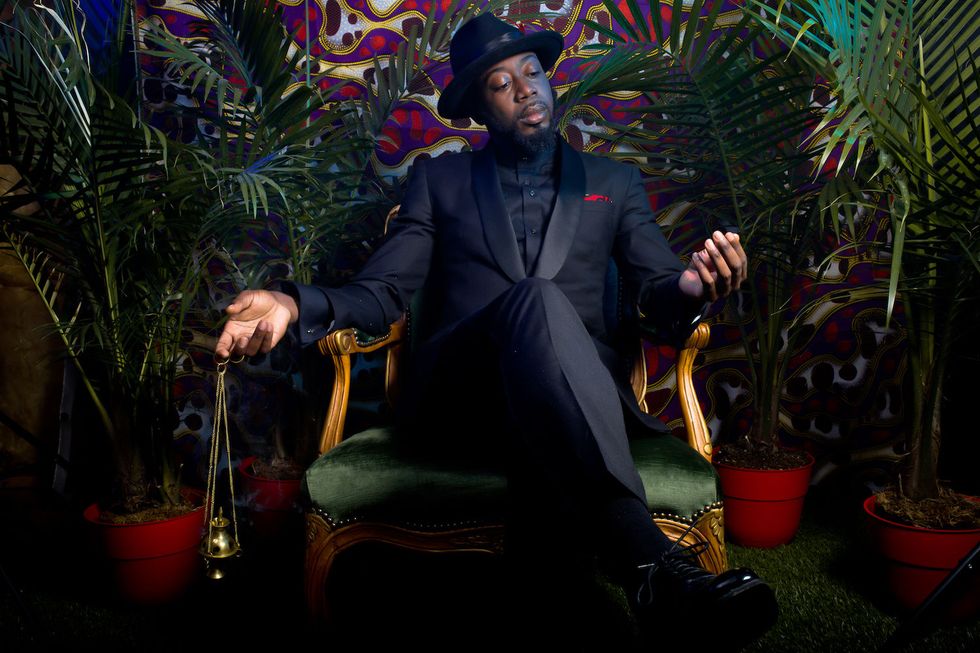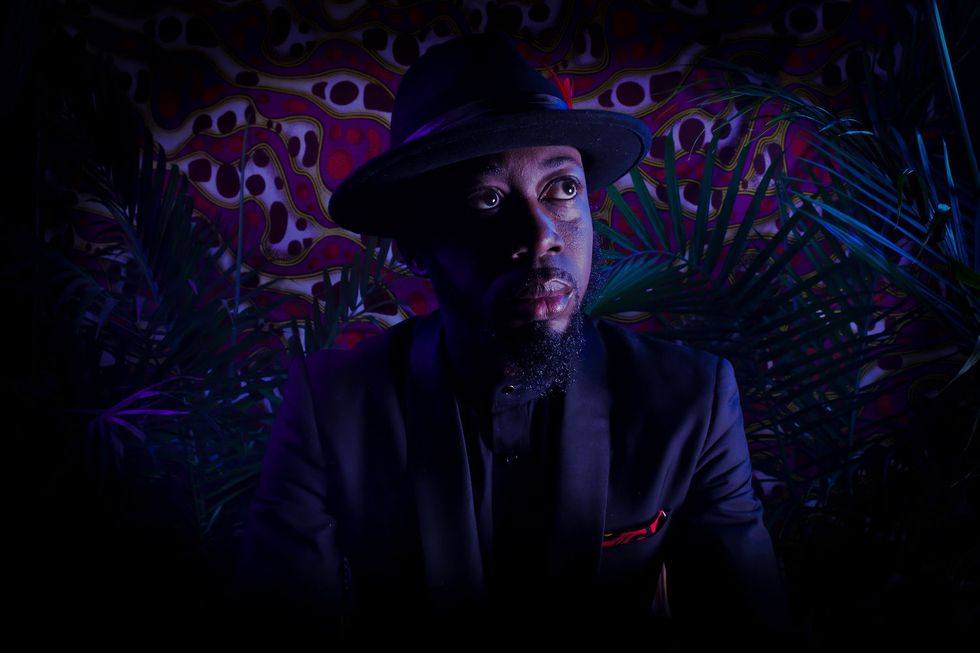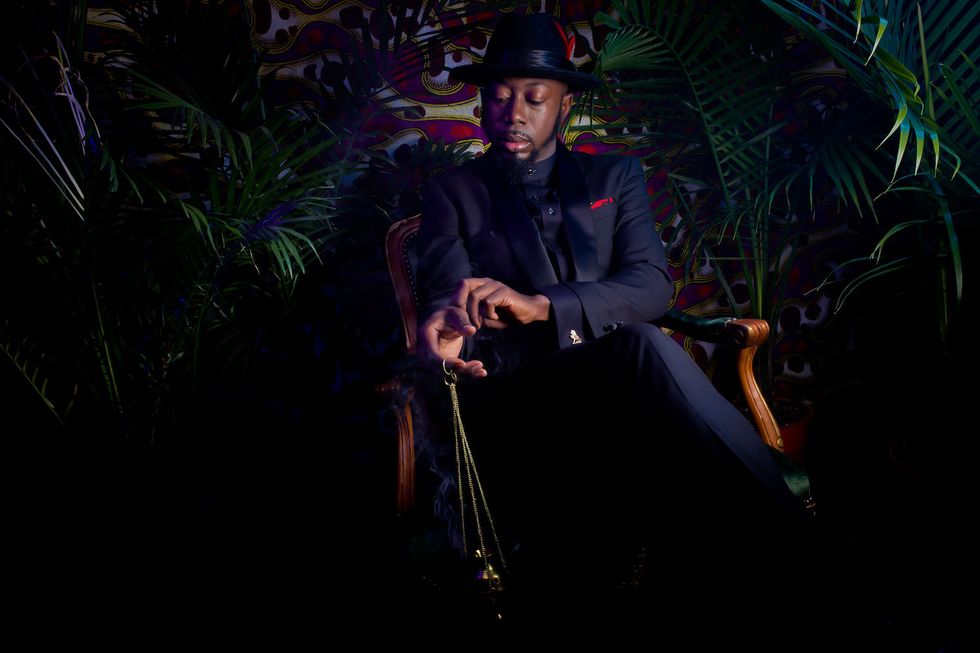In Conversation With Nana Kwabena on Identity, Music & Dream Chasing
Jidenna's brilliant producer Nana Kwabena opens up about his Ghanaian-American background & using sickle cell disease as a vehicle for empowerment through music.

“We already have so much in common,” I said to Nana Kwabena over the phone.
Naturally, I was shy: not only because I was speaking to Nana Kwabena, Jidenna’s brilliant producer, good friend and trusted collaborator, but because phone calls are such an intimate, underused way of communicating nowadays - especially with someone you’ve never met in person before.
Upon greeting, Kwabena’s phone voice is smooth and velvety, accented with a confident swagger. But after I told him all we have in common (we are both Ghanaian American, went to college in Pennsylvania, he has sickle cell and I have the sickle cell trait), his voice immediately perked up, climbed a couple of octaves, but simultaneously relaxed. I too, got comfortable, and realized this wasn’t going to be a normal interview. It would be a conversation.
We started exchanging anecdotes from our collegiate lives: like experiencing racism on our campuses in small Pennsylvania towns and even in Philly (a white homeless man denied Kwabena’s dollar and instead angrily called him “Nigger!”), and recognizing that racially progressive cities do not determine the social awareness of a whole state: “We ascribe where our country is at with the viewpoints of major cities like New York, Cali, Chicago, but those are really just very small portions of the states.” Real change isn’t centralized in one small spot: it spreads over vast areas like a wildfire.
I asked him how the different parts of his identity—Ghanaian American, having sickle cell, going to University of Pennsylvania, now residing in NYC—impact his individuality as an artist. His response was humble yet heroic: “All the things that make us different are actually our superpowers. When you embrace those differences, it's when people respond to it.”

Kwabena dived into the backstory of his life and career: he started off as a pre-med student at Penn, partly because he was genuinely interested in medicine but also because his dad was a “propagandist.” “He brainwashed us when we were kids to want to be doctors!” We exploded in laughter.
“My father literally took Jesse Jackson’s speech, 'I Am Somebody,' and changed the words to ‘I am somebody and I’m going to be a doctor.’ So most of my life I thought Jesse Jackson had an agenda to get all black people to become doctors, until I found out my father changed his words. Who goes that far?”
Kwabena says he was living two lives. The first involved studying bio and chemistry, taking the necessary steps to become an MD and research sickle cell. The other life was that of a gradually evolving, self-taught artist: he dabbled in poetry as a teen, then learned the art of spoken word, which soon transformed into him rapping.
But he needed beats to rhyme over, so he started creating his own. After composing songs, he learned how to DJ so that he could spin those tracks. Then, in college, he started performing with bands and eventually created his own DJ company. A remarkable musical renaissance was brewing beneath his lab coat. He was studying the art of medicine while teaching himself the science of sounds.For Kwabena, music and sickle cell are connected. He describes growing up in the hospital—with sickle cell disease, symptoms can become so severe that one spends long periods of time under the surveillance of doctors. At one point, he was there for 1-2 months at a time.
“All those machines and beeps and blips… after a couple of weeks, they start to create a symphony,” he says. “I had to create my own music to drown out the noise of those sounds.” Using Fruity Loops on his laptop, Kwabena started composing instrumentals. Upon leaving the hospital, he knew he wanted to pursue music. “Music has always been a part of my life. If I didn’t have sickle cell, I wouldn’t have taken it as seriously.”
Kwabena knew he still wanted to be involved in health and have an impact on sickle cell, but not as a doctor. He recalls conducting a research study while studying abroad in Ghana that observed whether or not kids with sickle cell disclose or conceal their sickness to others. He found that an overwhelming amount of kids hid their symptoms and even endured their pain attacks alone for fear of missing school or getting teased.
Kwabena realized that the social stigma behind sickle cell is just as pressing as the disease itself. Now, he’s determined to change the way we talk about it, and in doing so, he wants everyone to know he has the disease. It’s his superpower.
So how did Kwabena become a music producer? Simply put, he took a chance on himself—but he also had a back up plan. After completing his undergrad, he was accepted into public health school, but decided to defer attending for one year. Within that year, he moved to NYC to pursue music full time. “I told myself that if I got signed within that year, it would be a sign that I’m meant to do this.” What happened next surpassed his expectations—he produced songs with John Legend, and ended up working with Kanye West and Rick Ross.
However, he also faced a devastating challenge that year, as his brother died from sickle cell. “Death clarifies life,” Kwabena reflects. “All the things we’re preoccupied with and spend so much time on burn by the wayside, and what's left is your passion. I realized I needed to use music as a vehicle for tangible change in sickle cell disease.”

Kwabena started AllOneBlood, a nonprofit that spreads awareness about and raises funds for sickle cell disease. They visit patients in hospitals and clinics, compose mini documentaries featuring musicians who are impacted by the disease and will be having their inaugural fundraiser this summer in LA.
I was curious about how his parents took the news of his career change. His mom is supportive and spiritual—“She said ‘at the end of the day, I just want my children to know God’”—but she also has no idea who John Legend is, so maybe she has yet to feel the immensity of her son’s success. His father is also supportive, and brags about him to other people, but once every year he asks Kwabena when he’ll go back to school. Interestingly enough, Kwabena learned that his father secretly wanted to be a writer, but instead became a computer engineer. Maybe he’s living vicariously through Kwabena’s creative career.
Kwabena’s aesthetic embodies young, black, African cool, wrapped up in consciousness and social awareness. Along with Jidenna, the printed suit wearing chief with paprika waves and a grounded, commanding voice, they define their own, funkier version of hip-hop called ‘swank.’ Kwabena says that nowadays ‘ turning up’ means doing a collection of arm movements, but he wants his music to move people's bodies, while stimulating their minds. It’s a more interactive, but not innovative, relationship with music: one where the sounds flow through you while the words seep into your mental.For Africans, for black people, music started out this way. Talking drums were used to share information, have conversations and spread warnings. Enslaved Africans used songs to plan their escape, to backtalk their masters, to ignite hope, all in their native tongue to ensure secrecy, hold onto bits of their culture and throw off their masters. Music is more than culture and celebration, it’s survival.
“I’m trying to put people in a trance. If I can get your body moving, then I can get your spirit to open up, then your mind… It’s like yoga,” Kwabena says. “By doing different stretches and breathing and activating different muscles, it makes it easier for your spirit and mind to open up. That's why we call it party and ponder music—I’m gonna make you party first, but I'm gonna drop some real shit that will make you think about the world, yourself and humanity in a different way.”

It’s imperative to find the right partner to make this kind of music, effectively. This is what makes Kwabena and Jidenna vibe so well: their shared histories, similar backgrounds and parallel visions for the future of music. The duo met back in college, when Jidenna would visit their mutual friend, called Legion, at Penn and attend Kwabena’s parties. After graduating, Legion and Jidenna moved to the West coast and started Fear and Fancy.
Years later, when Kwabena moved to NYC to pursue music, he linked up with Jidenna via Skype. It was then that he realized they had very parallel paths. “I had just lost my brother, he had just lost his father. I was named after my grandfather who is a chief in Ghana, he was named after his father who was a chief in Nigeria.” Kwabena was looking for a solid musical partner, and Jidenna was the answer. “It was like two chiefs coming together, with very similar world views.”
Jidenna’s album, The Chief, reflects their dual talents, complimentary qualities and visionary mindset. Ranging from tales of love and loss (“Adaora” and “Bambi”) to come up stories (“Chief Don’t Run”), and commentaries on race, haters and gender (“White Niggas,” “Some Kind of Way,” “Trampoline”), The Chief is littered with thoughtful, metaphoric lyrics presented against rhythmic, captivating beats. Jidenna’s voice alone overflows with signature style, while Kwabena’s productions command your hips and feet to move. And together, their lyrics rise to the surface of your mind and dare you to think a little bit more.
But Kwabena has a soft spot for the last track on the album, “Bully of the Earth,” which he says was completed and submitted at the very last moment. It’s about deciding who you are as a man, especially after being impacted by a powerful and complex father figure, but also realizing that he too, is only a man himself. There are worse bullies in the world.“We joke about the African dad archetype, right? But in a lot of ways, our fathers were like tyrants in our lives when we were younger. We were small countries and they were the dictators. It makes you question what kind of man you will be, what you will take from them, and what you will leave behind.”
Women go through this as well with their fathers. We wonder how the way our father loved or treated us, or didn’t love or treat us, will impact the way we love another or worse, accept less from another. We carve ourselves out of their shadows. And more interesting is the complex we share with our mothers: how can a woman who crawls out of another woman ever measure up to the shape she imagined? In “Bully the Earth”, Jidenna sings, “you’re not a woman til you make your momma cry.” Part of growing up is denying what your parents mold you into, and finding your own form.
“We can’t be complacent right now,” he says, in reference to the song and to our current bully of the earth, Trump. Defining ourselves is just as necessary right now as defining our actions during the presidency, and globally. Kwabena and I contemplated the ways that Africans and all black people are reclaiming blackness and African culture: from the surge of black millennial travel to the growing appreciation of African music and fashion and the cross cultural connections that art and social media create, thus causing us to fall in love with our skin and spirits all over again. When we are united, how can one bully bring us down?
For Kwabena, art is all about unity, awareness, pride, swank, empowerment and especially movement. That last one— movement—can be defined in so many ways.

